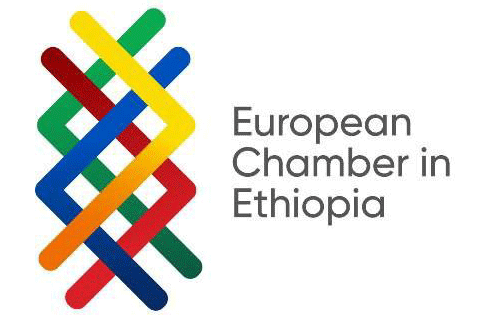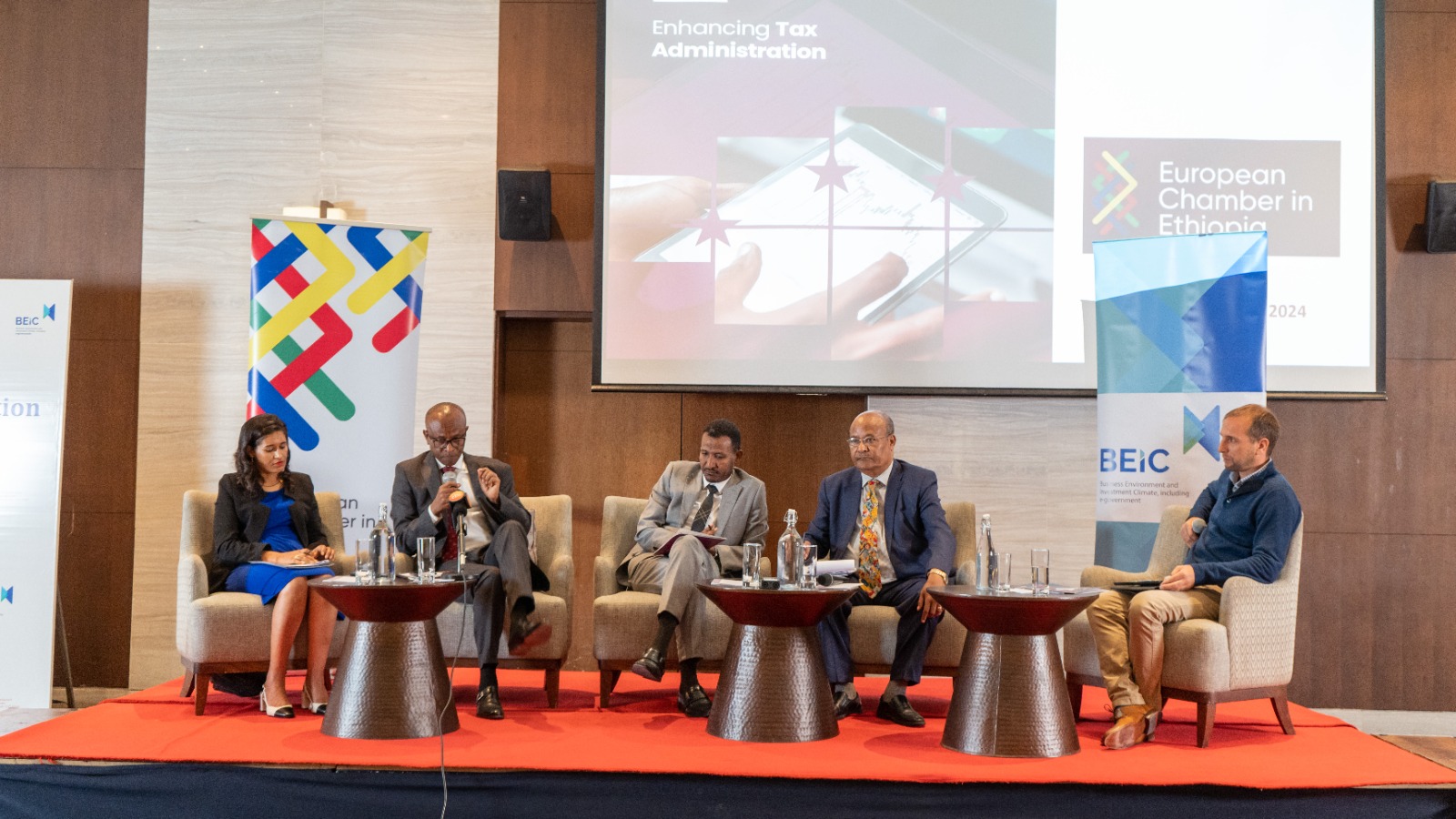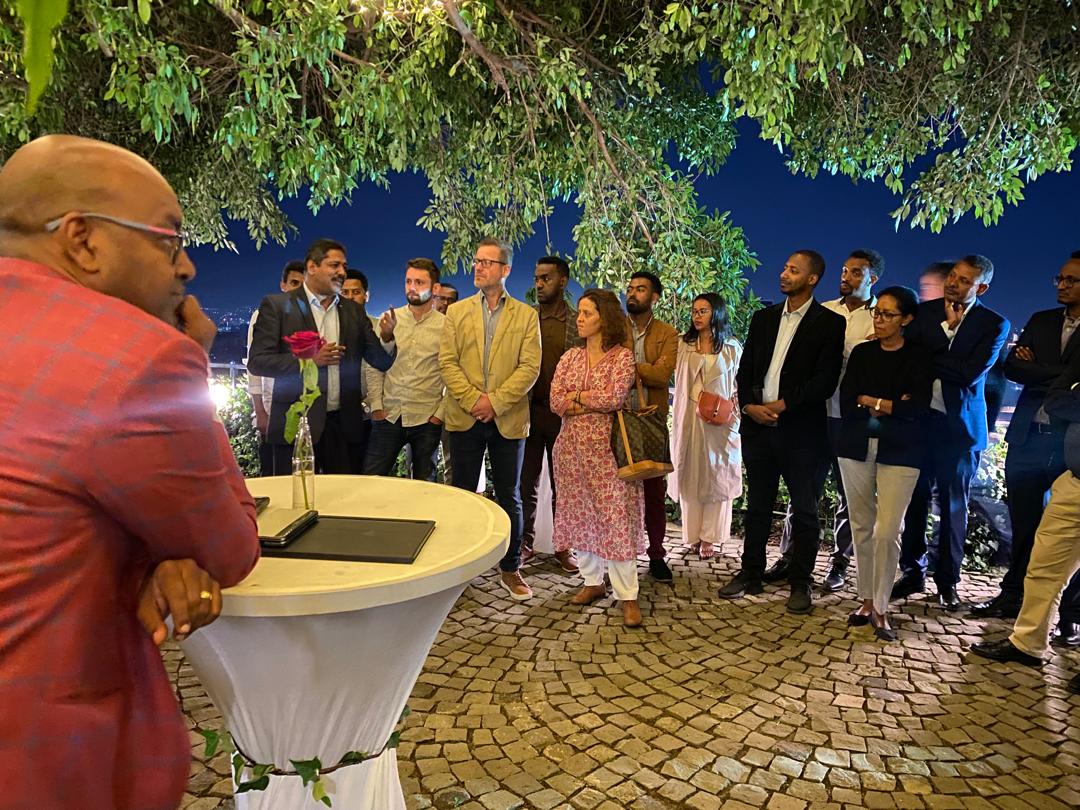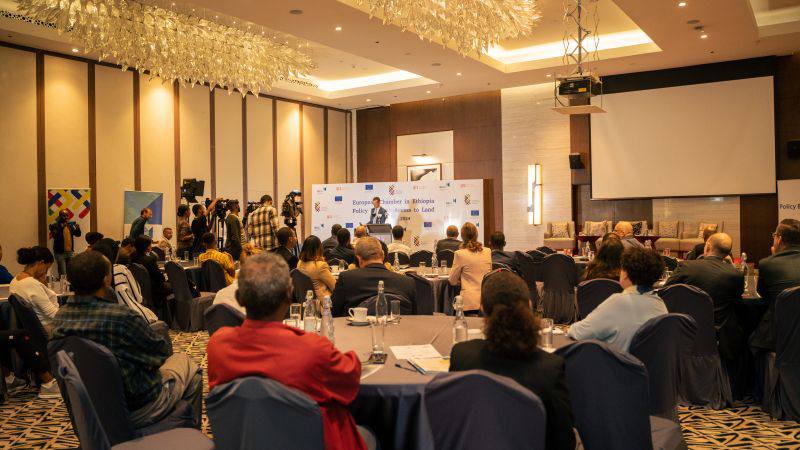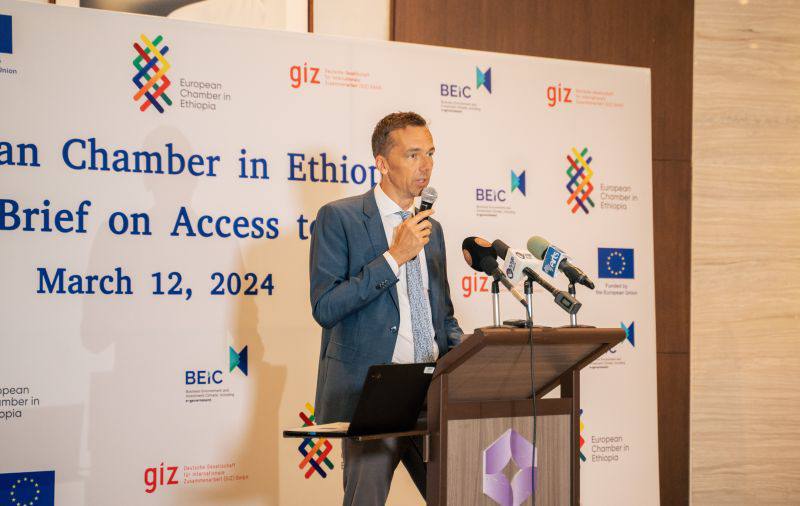The European Chamber in Ethiopia launches a Policy Brief on Access to Land for Investors
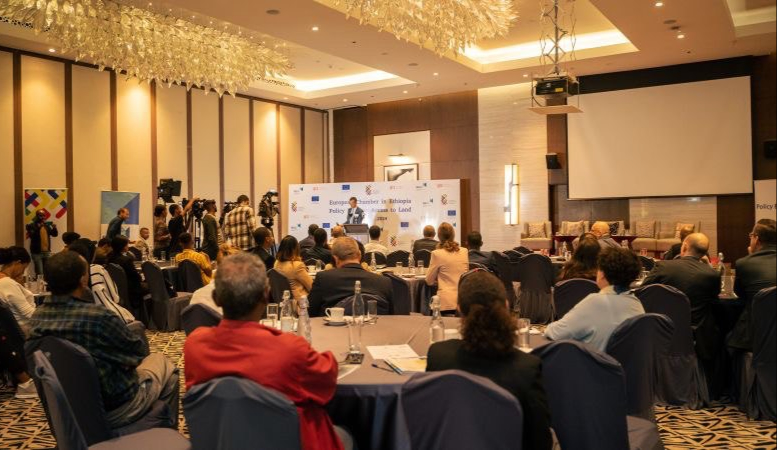
The European Chamber in Ethiopia launches a Policy Brief on Access to Land for Investors
[Addis Ababa, March 12, 2024] – The European Chamber in Ethiopia announces the launch of a policy brief focusing on access to land for investors. The document titled ‘Access to Land:Streamlining Land Acquisition for Investors Outside Industrial Parks’ discusses challenges associated with accessing land for foreign investment outside of the industrial zones in Ethiopia. The policy brief was produced by the European Chamber in Ethiopia in collaboration with the EU funded Technical Assistance for Business Environment and Investment Climate, including e-government (BEIC) project.
The document highlights challenges such as bureaucratic delays across different administrative tiers, insufficient pre-allocation of land, excessive compensation demands, and complications in compensation management (shifting from direct disbursement to communities to depositing into a resettlement fund). These issues are compounded by frequent changes in regional structures and land office officials, limited infrastructure to access existing land, coordination gaps between federal and regional authorities, fraudulent activities, administrative capacity issues and resource limitations, inconsistencies in land allocation and misuse of land by investors.
The policy brief puts forth a set of recommendations for the Ethiopian government to consider, one of which is the establishment of clear and consistent policies that promote transparency, fairness, and efficient land administration to encourage investment and economic development. Key suggestions include enhancing the capacity of land administration offices, fostering federal-regional coordination, implementing robust anti-corruption measures and ensuring a transparent land registry. Additional recommendations involve creating guidelines to calculate compensations and coordinating land valuation with relevant authorities such as the Ministry of Agriculture, improving the effectiveness of the one-stop shop service at the Ethiopian Investment Commission (EIC), developing allocation guidelines at all administrative levels, facilitating consultative meetings with displaced individuals, streamlining processes at regional land bureaus, and studying successful land reforms in countries like Vietnam to inform policy decisions.
The document summarizes the results of an online survey, one-to-one semi-structured interviews, and focus group discussions with relevant stakeholders, including Ministries, business associations, investors, and academics. Additionally, it evaluates Proclamation No. 1161/2019 concerning the Expropriation of Land Holdings for Public Purposes, Compensation Payments, and Resettlement of Displaced People. The objective is to identify challenges faced by the private sector, in relation to accessing land for investment in Ethiopia, thereby creating a conducive environment for private sector growth and attracting foreign investment to Ethiopia.
The policy brief was launched on March 12, 2024 at Hyatt Regency with the attendance of representatives of the Ministry of Agriculture, the Ethiopian Investment Commission, the European Union and the European Chamber in Ethiopia.
Since 2012, the European Chamber in Ethiopia, EuroCham in short and formerly known as EUBFE, represents the European business community in Ethiopia. The European FDI business association currently counts 180 members, and is an independent association licensed by the EIC. EuroCham envisions supporting Ethiopia becoming one of the most attractive business environments in Africa through an inclusive economy. EuroCham aims to support and empower European Businesses in Ethiopia through enhancing information exchange, establishing networking platforms and a continuous dialogue with the Government Stakeholder for jointly improving the business climate.
latest News
Italy-Ethiopia Agricultural Partnership at EIMA International Press Conference
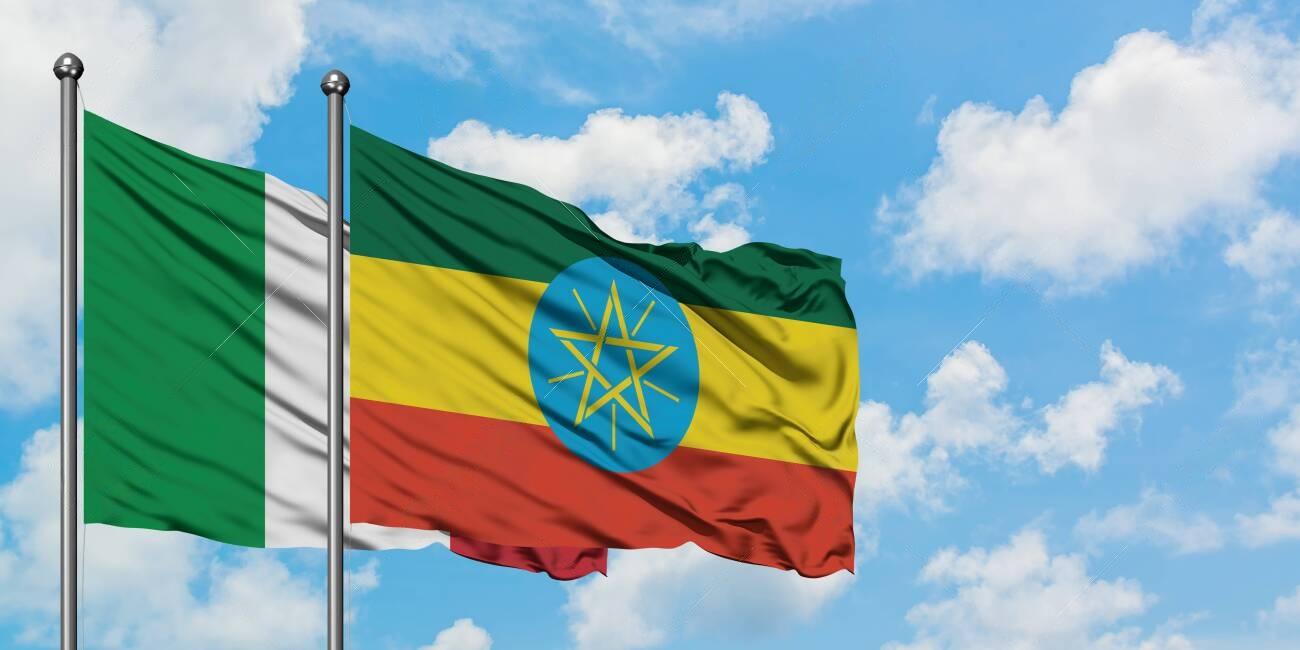
Italy-Ethiopia Agricultural Partnership at EIMA International Press Conference
EIMA International’s 46th edition was officially presented in Addis Ababa, signifying a milestone in Italy-Ethiopia agricultural cooperation. Riccardo Zucconi and Fabio Ricci emphasized Italy’s role as Ethiopia’s major supplier of agricultural machinery and the potential for further collaboration.
Zucconi stressed the need for mechanization in Ethiopian agriculture, highlighting Italy’s commitment to supporting local enterprises. Ricci expressed optimism about bilateral trade growth despite projected declines in exports.
The upcoming EIMA International in Bologna from November 6 to 10 is crucial for fostering cooperation. With over 50,000 models of machines, it offers cutting-edge solutions for Ethiopian agriculture. The Idrotech showcase features irrigation technologies crucial for sustainability.
Attendees include an Ethiopian delegation facilitated by the ICE Agency, promoting collaboration. Beyond exhibitions, EIMA offers diverse programs, including demonstrations of machinery for bioenergy and highly automated systems in agriculture.
For more details, click here.
latest News
Insights from EuroCham’s March CEO Networking Event: Exploring the Ethiopia-Somaliland Memorandum of Understanding

Insights from EuroCham’s March CEO Networking Event: Exploring the Ethiopia-Somaliland Memorandum of Understanding
EuroCham’s CEO Networking Event provided a platform for an insightful panel discussion on the recent Memorandum of Understanding (MoU) between Ethiopia and Somaliland. Dr. Paul-Simon Handy of the Institute of Security Studies shared nuanced perspectives on the geopolitical implications of the agreement. Attendees engaged in a robust dialogue, exploring the challenges and opportunities arising from the MoU, including its potential impact on regional stability and Ethiopia’s strategic interests. The event facilitated meaningful networking opportunities and deepened participants’ understanding of the complex dynamics surrounding the agreement.
latest News
CEO Networking Event Unveils Ethiopia's Macroeconomic Update amid Forex Liquidity Crisis
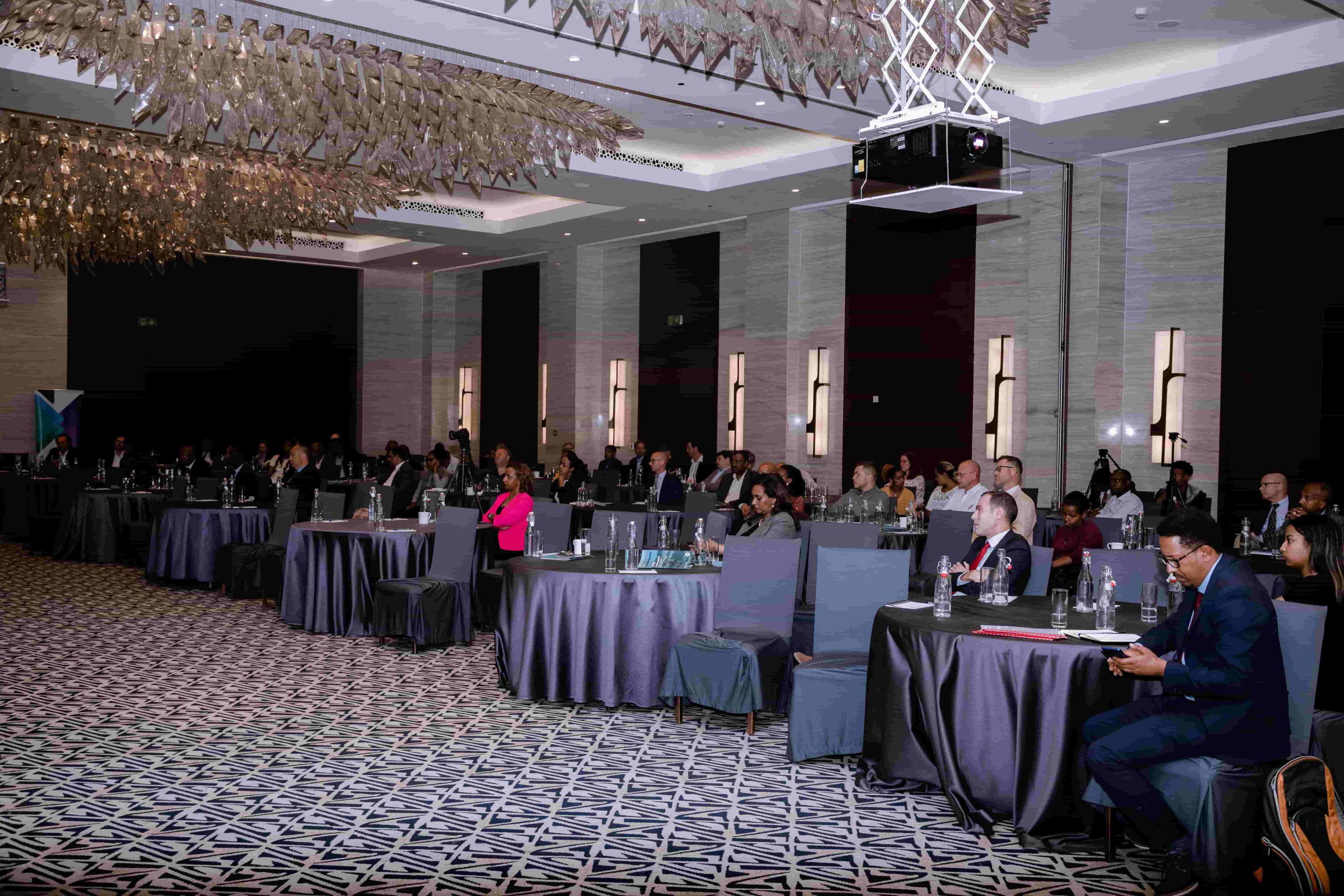
CEO Networking Event Unveils Ethiopia's Macroeconomic Update amid Forex Liquidity Crisis
In a recent EuroCham CEO networking event, industry leaders convened to discuss Ethiopia’s economic landscape, shedding light on crucial macroeconomic indicators and challenges facing the nation. The event featured a presentation by a senior macroeconomist, drawing his extensive experience in various global markets, including Angola and India, to provide insights into Ethiopia’s current situation.
One of the keynote points highlighted was Ethiopia’s impressive economic growth, with macroeconomic indicators showcasing a remarkable 6% increase over the last six years. Accordingly, the total population of the country as IMF estimates to be 107,000,000 million the nation’s GDP is thought to stand at USD 163 billion, boasting a per capita income of USD 1,500. Despite the absence of significant oil and gas exports, Ethiopia has managed its foreign debt effectively, totaling USD 27 billion, with a substantial portion sourced from multilateral and bilateral lenders the panelist asserted.
However, the country faces a significant challenge in generating foreign exchange, prompting the National Bank of Ethiopia to implement policies such as enforcing a 20% loan disbursement cap among local banks.
Additionally, Ethiopia has defaulted on Euro Bond repayments, albeit claiming the capacity to honor obligations uniformly across lenders prompting the country to be kicked out of the international capital market.
Key creditors such as China, the G20, and bilateral lenders play a crucial role in Ethiopia’s debt profile, facilitating negotiations for temporary relief programs to reschedule repayment obligations. The International Monetary Fund (IMF) is poised to assist Ethiopia in stabilizing its monetary policy as a going concern in light of the negotiations going on but demands stringent conditions, including aligning foreign exchange rates with the black market, broadening the tax base and reducing subsidies on imports.
Ethiopia’s investment decisions, particularly in industrialization efforts, aim to boost export revenues, notably in textile specialties seems to fail as the investment did not worth the return partly due to the challenge posed in relation with AGOWA. However, the challenges in forex reserve persist, due to dwindling forex remittances, lack of transparency in forex allocation as well as export commodities notably coffee used as a tool to generate forex and increased import appetite with a foreseeable decrease in reserves of forex denominations amidst rising foreign expenditure.
The ongoing civil unrest, notably in the Oromia and Amhara regions, exacerbates economic woes, with estimates suggesting a 3% GDP loss due to conflict in the earlier Tigray conflict. Negotiations with the IMF underscore the urgency for deregulation to avert a looming forex crisis, with calls to align official exchange
rates with those of the black market.
As Ethiopia navigates through these economic challenges, stakeholders emphasize the need for swift action to mitigate the adverse effects on the nation’s economic landscape.
latest News
EuroCham Engages in Constructive Dialogue with National Bank of Ethiopia
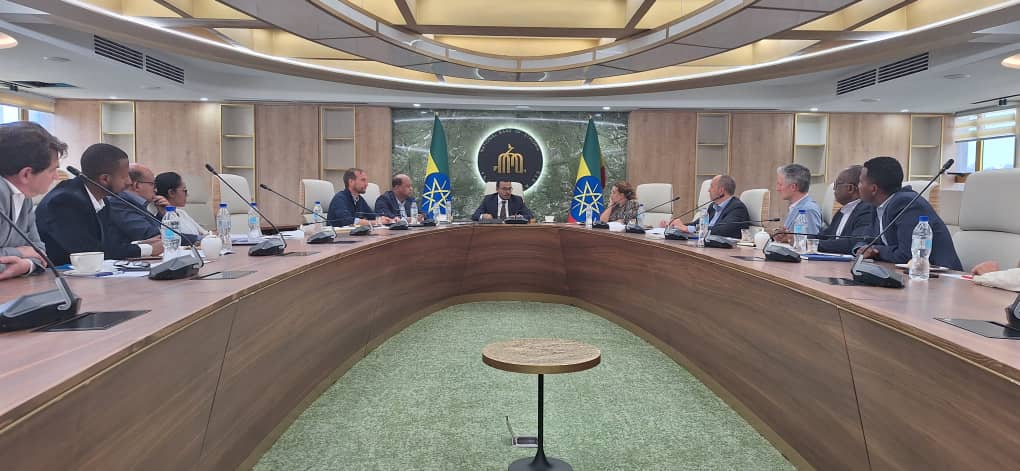
EuroCham Engages in Constructive Dialogue with National Bank of Ethiopia
On February 9, 2024, His Excellency Mamo Mihretu, the Governor of the National Bank of Ethiopia (NBE), welcomed EuroCham Board members to his office for a pivotal technical meeting. This meeting served as a platform forfruitful discussions on a wide array of fiscal policies and mattersfalling underthe jurisdiction of the NBE.
During the engagement, challenges faced by the European Foreign Direct Investment (FDI) community were candidly addressed. These challenges included hurdles in the clearance process from the delinquency list, lack of forex priority allotment for importing raw materials and capital expenditure (CAPEX) investments to substitute imports, transparency in foreign exchange (FX) allocation, and the exploitation of export commodities especially coffee for generating FX, alongside issues related to dividends repatriation and the potential offsetting of receivables versus payables.
Governor Mihretu acknowledged these challenges and highlighted ongoing efforts by NBE to address them. He emphasized NBE’s commitment to ensuring strict adherence to directives issued for managing FX allotment, while also stressing the need for fundamental solutions to address forex allocation challenges comprehensively.
In response to concerns about importers engaged in coffee exports, participants proposed reviewing certain business pathways, such as treating import and export performances separately. This proposal aims to prevent sustained losses from export activities leading to business liquidation or bankruptcy, thereby promoting sustainable export practices.
Regarding dividends repatriation, NBE recognized the longstanding challenges faced by FDI entities and proposed to look into backlogs as will be compiled by the European Chamber in a bid to allocate a certain percentage of dividends to signal commitment the Ethiopian Government in supporting FDI and enhance
investor confidence.
Discussions also explored the possibility of offsetting receivables versus payables, with NBE citing precedents like local currency swaps as potential solutions to explore further. NBE welcomed innovative proposals for intra-company arrangements, promising thorough examination on a case-by-case basis.
Finally, Governor Mihretu touched upon broader macroeconomic challenges and upcoming policy revisions in the forex regime aimed at ensuring price stability and the soundness of financial institutions.
The technical meeting between EuroChamber and NBE underscored the commitment of both parties to fostering a conducive investment environment in Ethiopia while addressing the concerns of the European FDI community
latest News
Customs Commission Revised Approval Process for Goods Imported on Franco Valuta
In a significant development affecting importers, exporters, and freight forwarders, modifications have been made by the Ethiopian Customs Commission to the approval process for goods imported on franco valuta under special conditions. The changes, mandated by a directive issued by the Commission, are poised to reshape how services are sought and delivered in this domain.
As of February 20, 2024, a revised protocol dictates that customers seeking approval for cases falling outside the established parameters must now direct their requests to the Head Office. This pivotal shift, outlined in Directive No. 66/2004, marks a departure from the previous practice of branch offices overseeing such approvals.
The directive, which cites Article 8(1) and Article 8(2) as its legal basis, underscores the necessity for compliance with the updated approval framework. Importers, exporters, and freight forwarders are urged to familiarize themselves with these amendments to ensure seamless adherence to regulatory requirements.
This progression will compel the European Chamber to voice its apprehensions regarding the obstacles encountered in importing Franco Valuta, attributable to Customs-related issues and delays. Additionally, the centralized application process for imports, directed to the Head Quarters, has exacerbated the situation, resulting in a significant portion of applications being denied. These impediments not only disrupt trade but also undermine the benefits linked with European Foreign Direct Investment (FDI) in Ethiopia. The Chamber calls upon authorities, including the Ethiopian Customs Commission, Ethiopian Investment Commission, and the Ministry of Finance, to swiftly tackle these challenges.
This development underscores the dynamic nature of regulatory frameworks governing international trade and underscores the need for stakeholders to remain vigilant and adaptable in navigating evolving compliance landscapes.
For further details regarding the revised approval process and pertinent regulatory documentation, concerned parties are encouraged to refer to the official communication issued by the Commission in the following links in original and unofficial interpretation of the document. Download File
Access to Land: Streamlining Land Acquisition For Investors Outside Industrial Parks
On March 12, 2024, the European Chamber in Ethiopia launched a policy brief addressing challenges related to land access for investors outside industrial parks in Ethiopia. Titled ‘Access to Land: Streamlining Land Acquisition for Investors Outside Industrial Parks,’ the document identifies bureaucratic delays, insufficient pre-allocation of land, and coordination gaps between federal and regional authorities as key obstacles. It offers recommendations to the Ethiopian government, including establishing clear and consistent policies, enhancing land administration capacity, and fostering federal-regional coordination. The brief aims to create a conducive environment for private sector growth and attract foreign investment to Ethiopia. EuroCham, representing the European business community in Ethiopia since 2012, is committed to supporting Ethiopia’s business environment. With 180 members, EuroCham facilitates information exchange, networking platforms, and dialogue with government stakeholders to improve the business climate. More information is available on EuroCham’s website: http://eurochamethiopia.eu/.
